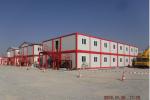After months of hard work and determination, personnel from 1 Engineer Support Unit (ESU), CFB Kingston can call their mission complete. The unit, which provides deployable, specialist military engineering services to the Canadian Armed Forces (CAF) and other government departments anywhere in the world, completed the design and construction of a $4.6 million camp in support of Operation IMPACT 2.0 in Erbil, Iraq.
Initially designed to support a tactical aviation squadron, as well as Joint Task Force Support Component (JTFSC) and Joint Task Force-Iraq command elements, the additional deployment of a Field Hospital to take over the American Role 2 Medical Facility caused the scope to increase. The end result—a 240-person camp with three accommodations buildings, three office buildings, four warehouses, a gym, as well as other infrastructure—proved to be one of the largest projects that 1 ESU has undertaken.
Tasked with the project last year, the job began with a considerable planning phase that included a wait for Iraqi entrance visas. By spring, the operational reconnaissance team had returned, and a preliminary design was completed before deployment.
In June, 2 Specialist Engineer Team (2 SET) arrived in-theatre and spent the first two weeks finalising the design and writing the statements of work (SOWs) for nine different construction contracts, the largest of which was managed by Defence Construction Canada (DCC). Understanding DCC contract policies and procedures meant a steep learning curve for the SET, but soon it became clear that DCC’s experience and skills were great assets for the team.
Concurrent to the design phase, site survey and ground preparation, the installation of a temporary, 170-person rental camp was undertaken. The month of Ramadan meant limited manpower for the construction of the rental camp, and numerous problems with the materials and construction of the units risked delaying completion. The 2 SET senior non-commissioned officers stepped up and took on the roles of trades people, normally the responsibility of the JTFSC Theatre Opening Engineers, and took over camp maintenance. From unplugging faulty plumbing to cleaning air conditioning units to repairing broken door handles, the SET trades people ensured the camp remained in good working condition. By working with contractors, the rental camp was completed just in time for the move from a local hotel to the rental camp.
After more than three months of designing, problem-solving, supervising, and building, the SET re-deployed to Canada. Despite short deadlines and limited personnel, the construction of Camp Érable was a success and provided the infrastructure needed for current and future CAF operations in Iraq.
Since 1990, 1 ESU has participated in over 30 international and domestic operations and is expected to deploy on another two missions this year.
Building Camp Érable
These statistics give a better appreciation for the work that occurred over three months to build Camp Érable:
- 6000 cubic metres of gravel placed and compacted;
- 1500 cubic metres of concrete poured;
- 1500 metres of main electrical cables installed; and
- 4000 square metres of floor space built for accommodations, industrial and administrative purposes.

